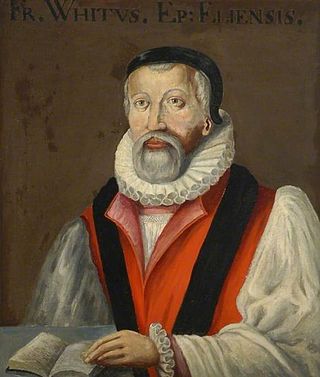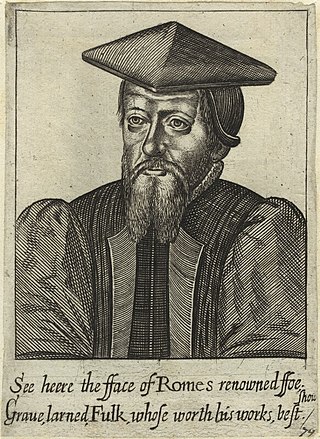Related Research Articles

John Aylmer was an English bishop, constitutionalist and a Greek scholar.

Samuel Harsnett, born Samuel Halsnoth, was an English writer on religion and Archbishop of York from 1629.

Francis White was an English bishop and controversialist.

William Fulke was an English Puritan divine.

Sir Francis Knollys, KG of Rotherfield Greys, Oxfordshire was an English courtier in the service of Henry VIII, Edward VI and Elizabeth I, and was a Member of Parliament for a number of constituencies.
Robert Some (Soame) (1542–1609) was an English churchman and academic. Master of Peterhouse, Cambridge from 1589, Some played a prominent part in the ecclesiastical controversies of his time, taking a middle course, hostile alike to extreme Puritans and Anglicans.
Perceval Wiburn or Wyburn (Percival) (1533?–1606?) was an English clergyman, a Marian exile, suspected nonconformist and Puritan, and polemical opponent of Robert Parsons.
Edward Dering was an English priest and academic, known as a classical scholar, controversialist, supporter of Thomas Cartwright, and fiery preacher against his fellow clergy. Constantly in trouble from 1570, he was not found to be nonconformist in doctrine, but was an opponent of the episcopate.

John May (Meye) was an English academic and churchman, who became Bishop of Carlisle. He also served the House of De Vere as cleric in Buckinghamshire.
Richard Howland (1540–1600) was an English churchman and academic, Master of Magdalene College, Cambridge, and of St John's College, Cambridge, and bishop of Peterborough.
Nicholas Robinson was a Welsh Bishop of Bangor and correspondent of Lord William Cecil, Sir Francis Walsingham, and Robert Dudley, 1st Earl of Leicester. He was also a dean and vice-president of a college at Queens' College, Cambridge.
Richard Cheyney was an English churchman, bishop of Gloucester from 1562. Opposed to Calvinism, he was an isolated and embattled bishop of the reign of Elizabeth, though able to keep his see.
Richard Longworth was an English churchman and academic, Master of St John's College, Cambridge and Dean of Chester.
Thomas Fowle was a Church of England clergyman, Fellow of St John's College, Cambridge, rector of Redgrave and Hinderclay, Suffolk, and prebendary of Norwich Cathedral.
George Gardiner (1535?–1589) was an English churchman, Dean of Norwich from 1573.
John Garbrand or Herks (1542–1589) was an English cleric, a prebendary of Salisbury Cathedral and friend of Bishop Jewell.
Thomas Cole was an English Protestant churchman, a Marian exile who became archdeacon of Essex.
William Charke was an English Puritan cleric and controversialist, known as one of those brought into the Tower of London to debate with the imprisoned Jesuit, Edmund Campion.
Oliver Pigg was an English Puritan clergyman.
Roger Kelke (1524–1576) was an English churchman and academic, a Marian exile and Master of Magdalene College, Cambridge from 1558 and Archdeacon of Stow from 1563.
References
- ↑ "Walker, John (WLKR547J)". A Cambridge Alumni Database. University of Cambridge.
- 1 2 3 4 5 . Dictionary of National Biography . London: Smith, Elder & Co. 1885–1900.
- ↑ See A Remembrance of the Conference had in the Tower betwixt M. D. Walker [[ sic ]] and M. William Charke, Opponents, and Edmund Campion, 1583.
- Attribution
![]() This article incorporates text from a publication now in the public domain : "Walker, John (d.1588)". Dictionary of National Biography . London: Smith, Elder & Co. 1885–1900.
This article incorporates text from a publication now in the public domain : "Walker, John (d.1588)". Dictionary of National Biography . London: Smith, Elder & Co. 1885–1900.